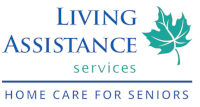If you care for aging family members, you may be familiar with aphasia—an acquired neurogenic language disorder that impacts speech and language comprehension due to damage to a specific area of the brain. This results in significant communication challenges, even in individuals who have a history of excellent language skills. It can come on gradually or suddenly depending on the cause.
Today, we’d like to offer a brief overview of the signs and causes of aphasia. If you have additional questions or suspect that an aging loved one has aphasia, we encourage you to reach out to your family doctor or other medical professionals for guidance.
What causes aphasia?
Aphasia is caused by damage to the language centres of the brain, which are usually on the left side. This is often the result of a stroke, head injury, brain tumour, illness involving a brain infection, or as a further complication of dementia. For example, a person with Alzheimer’s Disease may develop aphasia as a result of their dementia OR a cognitively healthy individual may experience aphasia after a stroke.
While the condition is directly related to damage to the brain, aphasia symptoms can be exacerbated by isolation, depression and other psychological factors.
What are the signs of aphasia?
There are several different types of aphasia but all result in significant communication issues. A doctor may diagnose the form of aphasia your loved one has using observational and medical testing (a CT scan or MRI, for example).
Individuals with Broca aphasia (expressive aphasia) may drop words like “the” or “and” from their vocabulary, making their sentences shorter and more difficult to understand. Their comprehension may or may not be significantly impacted. This type of aphasia often pairs with right side weakness or paralysis due to the location of the brain damage.
Wenicke aphasia is characterized by speech that involves long, complicated sentences with extra words thrown in. These individuals typically struggle with language comprehension as well as their own speech. Finally, individuals with global aphasia struggle with both speaking and comprehending the speech of others.
Tips for communicating with aphasia patients
The medical experts at John Hopkins recommend the following strategies for effectively communicating with individuals with aphasia:
- Include the person with aphasia in conversations
- Simplify language by using short, simple sentences and repeat key words
- Use a natural conversational manner at an adult level (no baby talk)
- Encourage all types of communication, including speech, hand gestures and pointing, or even drawing
- Do not correct the person's speech (they cannot control their mistakes)
- Give the person plenty of time to express themselves (be patient!)
- Help the person by connecting them with resources and support groups
How caregivers can support your family
Caring for a loved one with aphasia can be challenging and emotionally exhausting, particularly when additional conditions are involved. Our skilled, dedicated caregivers are available to offer support in your loved one’s home, ensuring that they’re well looked after while you get a break. They are familiar with aphasia and other common conditions, offering compassionate care that is delivered with respect. To learn more, please reach out to our team—we’d be pleased to answer your questions and offer a personalized quote for services.

